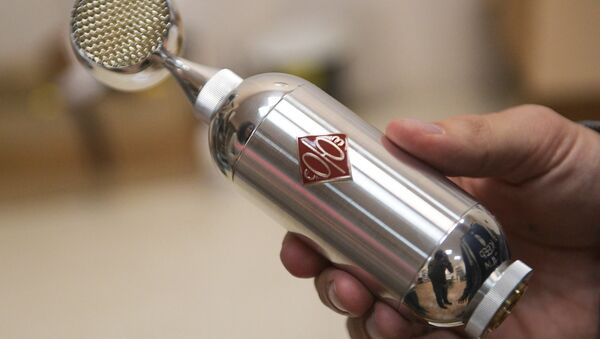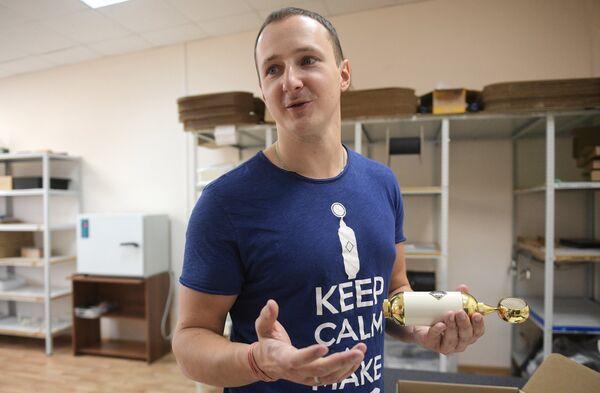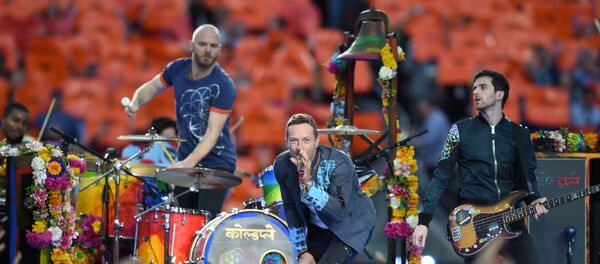A correspondent from Russia's RIA Novosti news agency visited Soyuz's production facility in the village of Mendeleevsky outside Tula to find out how the company makes its unique handmade microphones, and what it took to reach its newfound global status.
Soyuz occupies two floors at a very modest building some 20 minutes by car from Tula. The company has 12 employees: machinists, mechanics, engineers, a painter, a polisher, an accountant, a metalworking foreman and one of the company's two founders – Pavel Bazdyrev.
The young, casually dressed man does not look like a typical manager of a major brand, but looks can be deceiving. Before Soyuz, Pavel held a senior position in the Mars company, managed businesses in eight countries, and 12 factories, giving him the knowledge necessary to organize the production process. He's dreamed of having his own business since childhood, but admitted that before starting Soyuz, had neither formal musical or technical training.
"I am in favor of doing this here, in Russia, to contribute to the development of my country, in the city where I was born," Bazdyrev said. "Tula is known as gunsmith capital. We have a lot of specialists here in metalworking, tradesmen, people who are used to working with their hands. I previously lived for a while in Krasnodar, and cannot imagine starting this project there. People there have a different mindset, and are more about agriculture and tourism; you can't find people with such hands there," the entrepreneur explained.
All the specialists working at Soyuz are local. A machinist named Roman used to work at the 'Octave' microphone factory, and then for other Tula enterprises. The staff is a mix of veteran masters with immense experience and talented young specialists. The microphones' parts are all domestic, purchased from suppliers in Moscow, Bazdyrev proudly said.
"This is all ours – 100% Russian. The lathes too. This one we bought some time ago for 860,000 rubles," he said, pointing to one piece of machinery. "What's special about it is that it was originally a universal machine, with a factory accuracy of plus or minus four microns. We called Kalashnikov Concern and said: 'We need a machine with an accuracy of plus or minus one micron'," Bazdyrev recalled. "They replied: 'That's impossible – who is this? Some little kids? We have huge orders to fill here.' In the end, we found a company in Izhevsk, and they agreed to make the machine according to our requests."
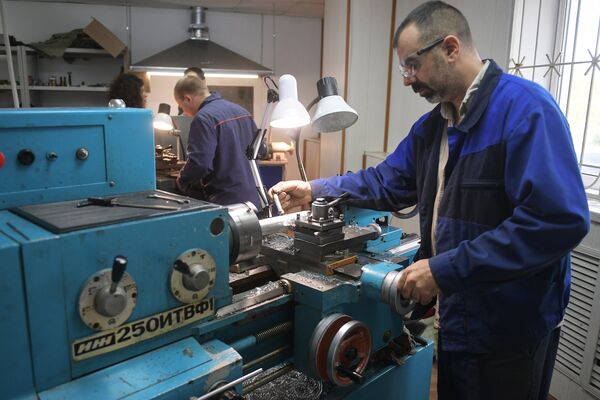
Even using a good machine, one set of microphone components can take up to several days to produce. The casing and internals are hand-crafted. Each microphone consists of between 70-90 parts. Bazdyrev has learned to make almost all of them himself, although naturally he is slower than the pros.
In a separate room, workers assemble the heart of the microphone – hand-made circuit boards, and as RIA Novosti points out, this is really work akin to that of a jeweler.
"We do not have printed boards…the boards are created by hand, taking three hours apiece; each mic has two, meaning it takes six hours to create one pair. In large-scale production, it could be done in five minutes –slap it together and it's ready. We have a different approach. In sound, it's important," Bazdyrev emphasized.
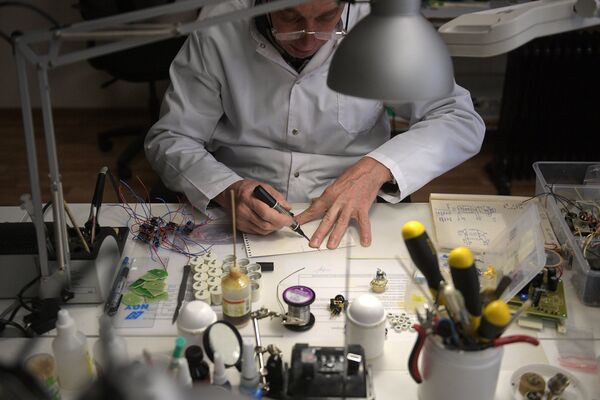
The box to each microphone, also made by a local carpenter, includes business cards with the names and photos of the masters who assembled the mic. The point is for the recipient to know that their microphone was made by real people, not built on an assembly line.
"The secret is the hands," Bazdyrev stressed. "When a product comes off an assembly line, it has no soul. Here, everything is made by hand, adjusted by hand, tested and sent to the client. It's like creating a hand-made violin. This is our advantage, but also a disadvantage, because if we get a large order, we can't just create it on the conveyor."
"A lot of people make clones of old microphones. We tried to create something handmade – something with its own special and unique sound – something that sounds cool and looks unlike any other microphone."
"David [David Brown, Soyuz's American cofounder] worked very hard on the design," Bazdyrev explained. "He drew everything up himself, from the sketch up to the emblem. It was inspired by images: of church domes, of Sputnik, the world's first satellite, and the Soyuz rocket. The Soyuz name is about the union of Soviet high-tech – the technologies of those times, proven and reliable as a Kalashnikov rifle, and of Western approaches to promotion and quality control."
It's not enough to assemble a team, come up with an idea and start selling. The hardest part was finding investors, the entrepreneur said. David Brown got lucky in New York, including through a chance meeting with a friend of his who had been looking for an interesting project to invest in.
That was in 2016, and since then Soyuz mics have been sold to 17 countries, from Chile to China. The company's real breakthrough moment was when Coldplay featured the mic in its new music video.
"We managed to get our microphone into a very cool studio in Malibu, the same one where the likes of Barbara Streisand and Michael Jackson would record. We sent it there for test. It lay there for a long time, unused, and we were thinking about taking it back. But suddently Coldplay came in to record their new album, and singer Chris Martin chose our mic from the dozen or so available. At first I did not believe it, but when the video came out, it was ecstasy," Bazdyrev recalled.
Oddly enough, in its home country, Soyuz still only has one dealer. The problem is that the domestic recording industry is more focused on Western trends, the businessman said. "People started buying our microphones only after it received approval in the West." They are the trendsetters, he stressed.
Soyuz sells between 30-80 microphones a month. The cheapest, used for instrumental recording, costs $600, the most expensive $3,500. The latter are used by Coldplay and Radiohead. The company has five models, and no shortage of demand.
"It could not have turned out been any other way," Bazdyrev insisted. "David and I put our soul into this business. In principle, this synergy of East and West works great. David has his views on doing business and promotion; he sometimes comes up with cool ideas that I could not have even dreamed of. At the same time, I'm here with the guys doing things which he couldn't think of. The difference in mentality is only a plus as far as I'm concerned. This is really a case where '1+1=5'."
Ultimately, the businessman is convinced that there are many Russian companies with great potential for doing business in the West, but that often they do not think of exports, focusing on the local market instead. Of the 15,000 enterprises in Tula, less than 1% are exporters. Bazdyrev hopes Soyuz's example will prompt other companies to enter the world market. "Russia has tremendous potential; we need to open it up, to go out into the world, and tell people what we can do," Bazdyrev concluded.
